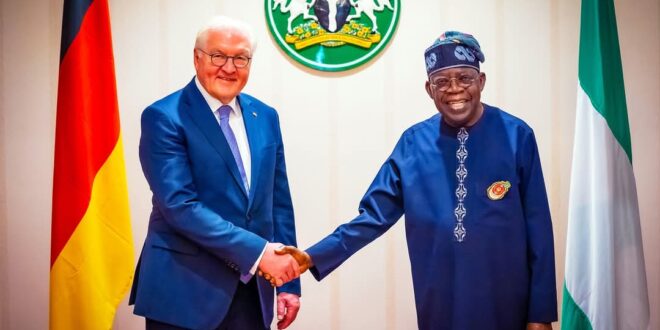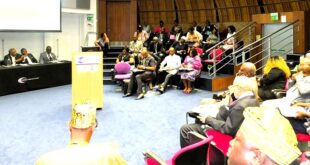Bilateral trade between Germany and Nigeria surged by 30 per cent to about €3 billion (≈ US $3.2 billion / ₦4.8 trillion) in 2025, according to German Ambassador to Nigeria, Annett Günther. Nigeria is now Germany’s second-largest trading partner in Sub-Saharan Africa, the diplomat said at a press briefing in Abuja on Thursday.
The sharp increase in trade volume comes ahead of the next meeting of the German‑Nigerian Binational Commission (GNBC), scheduled to be held in Berlin in two weeks. Ambassador Günther said the rise reflects Nigeria’s ongoing economic recovery and the expansion of German business engagement across energy, pharmaceuticals and manufacturing.
Trade: What’s Behind the Numbers?
In 2024, German exports to Nigeria were dominated by machinery and mechanical appliances, valued at around US $307 million (≈ ₦460 billion). Other major exports included electrical and electronic equipment, plastics, vehicles and medical apparatus.
According to Nigerian data, total trade between the two countries in 2024 reached ₦2.95 trillion (≈ US $1.97 billion) — comprising ₦1.68 trillion (≈ US $1.12 billion) in exports from Nigeria and ₦1.26 trillion (≈ US $840 million) in imports.
This surge is occurring as Nigeria recorded a balance of payments surplus of US $6.83 billion (≈ ₦10.25 trillion) in 2024, reflecting rising investor confidence and stronger export performance.
Key sectors driving bilateral trade include:
-
Energy & raw materials – Germany views Nigeria as a strategic partner for critical minerals and the development of a green hydrogen value-chain from production to transport and storage.
-
Manufacturing & infrastructure – Over 90 German firms are now active in Nigeria, supporting around 17,000 jobs, according to Ambassador Günther.
-
Migration & education – Enhanced movement of people, legal migration pathways, and student/worker visas are part of the broader cooperation agenda. The ambassador emphasised that “all the common goals and projects would not work if they were not supported by travel on all levels … plus legal migration.”
The Binational Commission at a Glance
The German-Nigerian Binational Commission, established in 2011 with its first meeting in April 2012, operates through working groups on business, energy, migration, culture and politics. Its aim is to deepen bilateral cooperation beyond trade — into stability, education, renewable energy, migration management and security.
The Commission’s role has become increasingly relevant as both countries seek to expand collaboration in strategic sectors. For example, in 2021 Germany extended its Energy Partnership with Nigeria under its National Hydrogen Strategy, which included the opening of a Hydrogen Office in Abuja.
Defence and security cooperation are also part of the framework: in April 2025 both countries signed a renewed memorandum of understanding on defence partnership and technical advisory support.
Why It Matters for the African Diaspora and Business Community
For Nigerians in Germany and advocates of Africa-Europe cooperation, this growing trade relationship signals fresh opportunities — and important challenges. Enhanced German investment and stronger institutional ties through the GNBC open new channels for technology transfer, job creation and skills development. But the terms and structure of these partnerships remain crucial.
The strong growth underlines Nigeria’s recovery momentum and Germany’s drive to diversify trade and secure future-facing supply chains. As Nigeria pushes to strengthen non-oil exports and Germany navigates domestic economic headwinds, both countries share a stake in making this cooperation inclusive, sustainable and mutually beneficial.
For The African Courier’s readership, this development is a reminder that diaspora voices, African entrepreneurs and integration efforts can benefit from the evolving Germany-Nigeria axis — provided migration pathways, policy frameworks and business collaborations deliver tangible results rather than mere rhetoric.
Kola Tella
 THE AFRICAN COURIER. Reporting Africa and its Diaspora! The African Courier is an international magazine published in Germany to report on Africa and the Diaspora African experience. The first issue of the bimonthly magazine appeared on the newsstands on 15 February 1998. The African Courier is a communication forum for European-African political, economic and cultural exchanges, and a voice for Africa in Europe.
THE AFRICAN COURIER. Reporting Africa and its Diaspora! The African Courier is an international magazine published in Germany to report on Africa and the Diaspora African experience. The first issue of the bimonthly magazine appeared on the newsstands on 15 February 1998. The African Courier is a communication forum for European-African political, economic and cultural exchanges, and a voice for Africa in Europe.






























